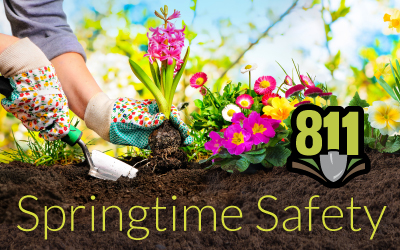
Spring has arrived in Georgia, prompting homeowners to get outdoors to tackle do-it-yourself projects like sprucing up the yard or installing a fence. It’s also the season when everyone is on guard for severe storms.
Whatever spring brings, Walton Gas and Atlanta Gas Light remind you that natural gas safety doesn’t end when the heat turns off. Remember to exercise care around natural gas lines and meters all year long. Follow these rules to avoid and identify dangerous gas leaks that can occur when warmer weather arrives.
#1 Dial before you dig
Did you know “call before you dig” is a law in Georgia? Whether you’re planting a tree, plowing up a garden spot, sinking posts for a fence or mailbox, or putting in a sprinkler system, the law applies. Atlanta Gas Light provides these guidelines for any activity that involves using a shovel or equipment to move earth.
- Before starting any outdoor digging project, dial 811 or visit Georgia 811 at least three days in advance to request to have underground utility lines marked. Requests can be made 24-hours a day, seven days a week. The service is free.
- Wait for underground utility lines to be marked before digging. Locators will mark the approximate location of buried lines with color-coded spray paint, flags or stakes corresponding to the utility. The color used for natural gas is yellow.
- Use hand tools to carefully uncover the area around a utility line when you need to dig near location markers.
- Make sure the marks remain visible during the project. If the lines are damaged or removed, contact Georgia 811 to have them remarked.
Watch the video: https://www.youtube.com/watch?v=97FI27tA8do
#2 Plant with care
Vigorous tree roots are capable of moving gas lines, especially small-diameter ones in home landscapes. In addition, roots growing around a gas line can damage the structure, allowing the escape of gas. Roots that grow around pipelines also interfere with the pipeline workers’ ability to inspect and maintain the lines.
Take care when installing new landscaping. Consider the mature size and root zone before planting a tree. Call 811 to locate gas lines and other underground utilities before installing landscaping or pulling out shrubs or trees.
#3 Mind the meter
Approximately 5% of hazardous natural gas leaks are caused by damage to customer meters. While doing yard work, remember these safety tips:
- Maintain 2 feet of clearance when mowing or trimming around meters. Use hand tools to landscape within the 2-foot buffer zone.
- Do not hang or lean tools on or against meters.
- Use caution when trimming tree branches and shrubs near meters.
- Keep mulch or garden rocks at least 6 inches below the bottom of gas meters.
- Plant shrubbery away from gas meters to allow access in the event of an emergency.
#4 Use your senses
Stay alert for gas leaks while working outside. A gas leak may be indicated if you:
- Smell a “rotten egg” or sulfur odor.
- See dead vegetation or discolored soil near a pipeline.
- Hear hissing or a high-pitched whistle or your meter is very noisy.
#5 Be storm savvy
Georgia experienced more tornadoes than usual in the spring of 2023, according to the National Weather Service. Most tornadoes (and the flooding that may accompany them) occur in March-April-May. To remain safe in storm season, Walton Gas customers should remember:
- Hands off the valve. Atlanta Gas Light advises against shutting off the valves to natural gas meters when a major storm is predicted. Leaving the gas on helps ensure proper pressure is maintained in the pipes, which helps prevent water from entering the lines should flooding occur.
- Do the sniff test. If a tornado or severe storm strikes your community, the first test for gas line damage is smell — both inside and outside a home or business. Remember that uprooted trees or fallen structures can damage underground lines and cause a natural gas leak risk outdoors, too.
- Inspect first. If you don’t smell the rotten egg odor of natural gas, do a quick post-storm check of your furnace, water heater and other natural gas appliances to ensure there’s no damage. Be sure chimneys, flues and vents are clear of debris or any other obstructions. If flooding occurs, don’t operate any gas-powered appliances that may have been under water. Water-damaged appliances should be inspected and repaired by a qualified technician.
If a natural gas line is damaged accidentally or the distinctive rotten egg odor is detected, call 911 or the Atlanta Gas Light 24-hour emergency phone line at 877-427-4321 from a safe location. Do not operate any machinery or equipment that might cause a spark or create an open flame. Learn more about natural gas safety atlantagaslight.com/safety.
